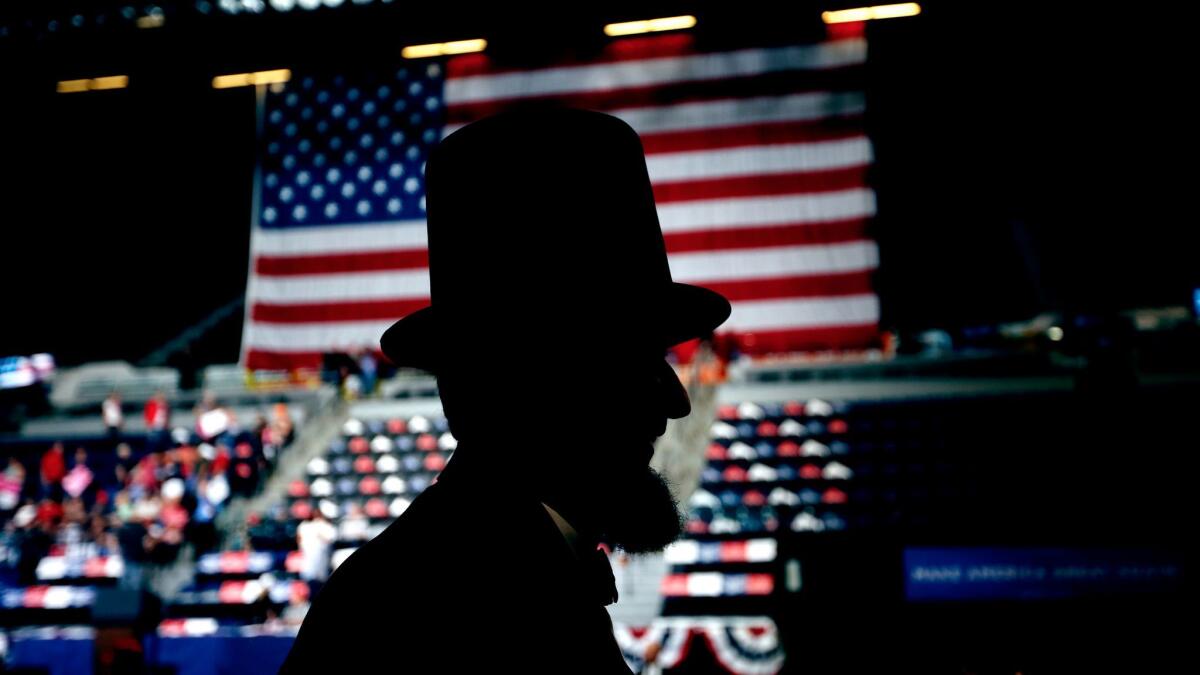Op-Ed: What would Lincoln think of Trump?

- Share via
Donald Trump has a sketchy relationship with Abraham Lincoln. “Great president,” Trump said. “Most people don’t even know he was a Republican, right?” Trump also conjectured that “had Andrew Jackson been a little later, you wouldn’t have had the Civil War,” though Jackson had died many years before.
But what would the 16th president have thought of the 45th? Beyond pure speculation, we can find clues in Lincoln’s first formal speech, “The Perpetuation of Our Political Institutions,” in which he criticized attacks on the free press and warned against a future demagogue who would threaten the fragile American experiment.
On Jan. 27, 1838, mounting the podium before the Springfield Lyceum for Young Men in Illinois, the 29-year-old Lincoln, a member of the Illinois Legislature, described the “mobocratic spirit.”
Lincoln began by decrying a spate of recent crimes that reduced the rule of law to “the caprice of a mob,” including the lynching of a black prisoner in St. Louis. “Having ever regarded Government as their deadliest bane, they make a jubilee of the suspension of its operations; and pray for nothing so much, as its total annihilation.” He also condemned the “bands of hundreds and thousands” who “throw printing presses into rivers, shoot editors” – which everyone in the audience would have recognized as a reference to the Lovejoy case.
Trump’s sense of history is as limited as his self-control.
On Nov. 6, 1837, in Alton, Ill., Elijah P. Lovejoy, an antislavery editor, was murdered by a group of men who stormed his warehouse to destroy his printing press. Lovejoy had been driven out of St. Louis for publishing antislavery articles. Moving his base of operations across the Mississippi River, he soon joined in calling for the formation of the Illinois Anti-Slavery Society. Lovejoy’s assassination made him the first martyr of the abolitionist movement. His killers were acquitted in a trial that reached its verdict eight days before Lincoln delivered his speech.
The overwhelming view in Illinois was that Lovejoy deserved his fate. Promoting antislavery opinion was deeply unpopular. In Washington, lawmakers upheld a gag rule that barred the presentation of antislavery petitions to Congress. Former President John Quincy Adams, now serving in the House of Representatives, stubbornly led the resistance. But Northern legislature after legislature passed resolutions in solidarity with Southern states to affirm the gag rule. On March 3, 1837, Lincoln and only one other member of the Illinois House signed a dissenting statement declaring “that the institution of slavery is founded on both injustice and bad policy.”
Lovejoy, according to Lincoln, did not bring about his own death. Contrary to conventional wisdom, he was wholly innocent, the victim of “the vicious.” Those who “shoot editors” were not simply breaking the law, but also assailing the basic right of free speech – the very foundation of American government. The attack on Lovejoy, whether one agreed with his opinions or not, was an attempt “to subvert our national freedom.”
Then Lincoln pointed to an even greater menace than rampaging mobs, “a probable case, highly dangerous.” He warned against the emergence of a man driven to power by a fierce desire for “celebrity and fame” who “thirsts and burns for distinction.” This demagogue “scorns to tread in the footsteps of any predecessor, however illustrious,” and believing that “nothing left to be done in the way of building up, he would set boldly to the task of pulling down.”
There is a contemporary figure who resembles that fame-hungry demagogue, one who tears down institutions and incites the mobocratic spirit, subverting the right to free expression and, with it, our national freedom. These Lincolnian terms describe our reality-TV-star-turned-president, who called the “FAKE NEWS media” the “enemy of the American people,” and tweeted an altered video that showed him body-slamming a man with the CNN logo in place of his head.
But Trump would no more understand Lincoln’s forewarning than he will accept responsibility for his incitement. Trump’s sense of history is as limited as his self-control.
If we can deduce how Lincoln would perceive Trump, we can also surmise how he would advise Americans to handle him. This is what he said about the possible rise of an American demagogue: “And when such a one does, it will require the people to be united with each other, attached to the government and laws, and generally intelligent, to successfully frustrate his designs.”
Sidney Blumenthal is the author of “Wrestling With His Angel, The Political Life of Abraham Lincoln, Volume II, 1849-1856.” “A Self-Made Man, The Political Life of Abraham Lincoln, Volume I, 1809-1849,” describes Lincoln’s Lyceum Address.
Follow the Opinion section on Twitter @latimesopinion or Facebook
MORE FROM OPINION
L.A.’s streets have become a de facto toilet. We need more public restrooms
The six categories of Trump apologetics
Obamacare is only ‘exploding’ in red states
More to Read
A cure for the common opinion
Get thought-provoking perspectives with our weekly newsletter.
You may occasionally receive promotional content from the Los Angeles Times.










